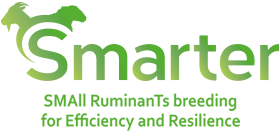
This project has received funding from the European Union’s Horizon 2020 research and innovation programme under grant agreement No 772787.
Newsletter Issue 3 – Editorial
SMARTER has hit the ground running during the first 18 months since its inception (November 2018). The reason is because the scientists and industry partners have built into the project, a combination of existing and new data sets to address the key questions in the project specifically related to sheep and goats. Much of the key messages that will emanate from the project rely on sound data recording both from industry and experimental populations of animals, with the focus being on characteristics associated with offspring performance coupled with maternal efficiency. We have begun to disentangle the genetic basis to new traits associated with animal resistance and resilience to disease as well as key aspects underpinning performance and profitability. As well, new definitions and ways of recording feed efficiency and other key traits important for animal efficiency and resilience, will enable the results from this project to provide practical advice to farmers and policy makers alike.
By combining the research focus around key production traits as well as widening breeding objectives to capture key aspects of animal resilience, we are then able to better understand any possible trade-offs that might be associated with breeding programmes that combine both. To this effect, SMARTER is both undertaking modelling as well as data analyses to better understand the genetic relationships amongst resilience/ resistance and productivity, so that the implications of combining (potentially) antagonistic breeding goals can be determined. The impact of this information will be that the results will be tested for use in practice to be then applied in national (and potential international) breeding programmes. You can read more about this latter aspect of the project in the ‘International Evaluations’ section of this newsletter.
SMARTER welcomes any group associated with sheep and goat production to become stakeholders of SMARTER, which then enables the impact of the results to be spread more widely. To this end, we welcome two new stakeholders from Italy and Cyprus onto our stakeholder group, which we anticipate will benefit from our interactions with them in the future. We also have gained two new partners to the consortium from the UK/New Zealand and Italy. You can read more about these new stakeholders and partners below.
Despite the COVID-19 pandemic, SMARTER partners have demonstrated their ‘resilience’ to the crisis by being able to deliver to the major milestones for much of the data-driven areas of work. However, some of the experimental work has had to be postponed, and we anticipate being able to ‘catch up’ over the remainder of the project albeit with some alterations to plans and deadlines. As we adapt to having shifted much of our working lives to being online and at home together with children, pets, deliveries noise and other demands, we are fortunate in having already built strong working relationships amongst people who share their passion internationally in the development of resistance and resilience breeding solutions to the small ruminant sector.

